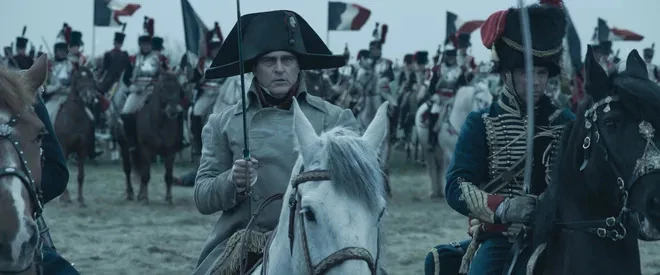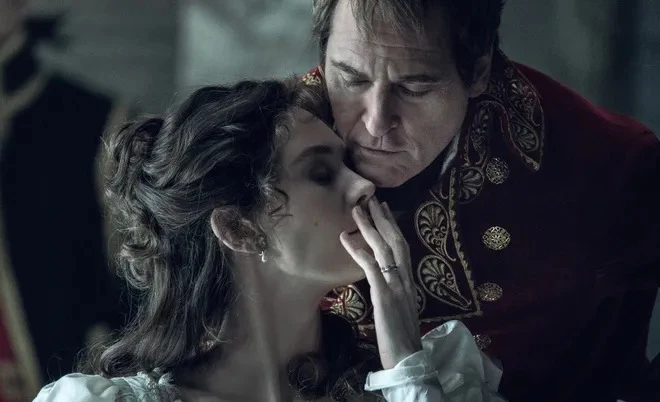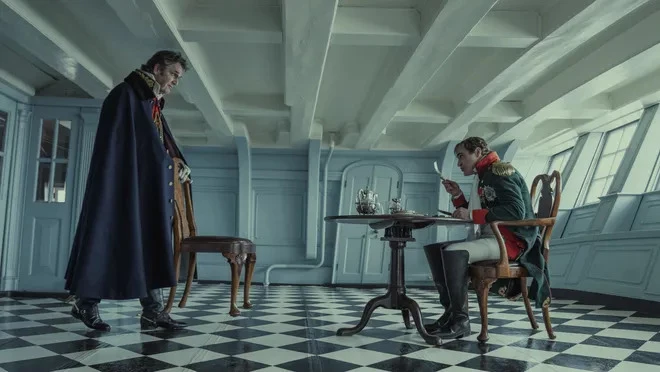Prepare for a historical epic like no other in Ridley Scott's "Napoleon," where Joaquin Phoenix redefines the iconic French p with a performance that blends satire, drama, and a dash of personal tragedy. Buckle up for a wild ride through history as we explore the highs and lows of Napoleon Bonaparte's life, all while Phoenix leads the charge with his magnetic portrayal.
#1. A Comedic Conquest: The Unlikely Humor Of Napoleon
 Source: Apple Original Films
Source: Apple Original Films
In a surprising departure from the serious tone of historical dramas, "Napoleon" introduces us to a side of the infamous Frenchman that's as humorous as it is historical. From the guillotine's grim humor to Phoenix's witty banter as Napoleon, the film successfully injects satire into pivotal moments. Joaquin Phoenix's nimble performance adds layers of humor to Napoleon's character, proving that even the weightiest historical subjects can be approached with a light touch.
The film opens a window into Napoleon's world in 1789, where he's not just a military strategist but a man with ambitions beyond being labeled a Corsican "brute." The 1793 Siege of Toulon became a turning point, dealing a heavy blow to the despised British and propelling Napoleon into the limelight. It's at a party where he locks eyes with Josephine, a former aristocrat recently freed from the Reign of Terror, sparking a relationship that weaves through the film.
As the narrative unfolds, Phoenix's Napoleon evolves from a gunnery officer to a military commander and, eventually, emperor. Yet, amidst political and military victories, the film paints a picture of a tumultuous relationship with Josephine, portrayed by the brilliant Vanessa Kirby. The love story between the two survivors is both poignant and humorous, reaching its peak when Napoleon discovers Josephine's infidelity during his campaign in Egypt. The ensuing dinner table exchanges reveal a domestic side of Napoleon rarely explored in historical epics.
#2. Love, War, And the Duke Of Wellington: Unraveling Napoleon's Complex Relationships
 Source: Adian Monaghan
Source: Adian Monaghan
Navigating the intricate web of Napoleon's relationships, the film delves into his romantic entanglements and military triumphs. Phoenix's portrayal skillfully balances the confident military leader with the vulnerable husband, offering a nuanced look at the complexities of Napoleon's character.
The dynamic between Napoleon and Josephine is a highlight, transcending the typical historical drama formula. Their dinner table spats, where Josephine calls him "fat" and Napoleon responds with a nonchalant "I enjoy my meals," provide a comedic respite amid the intensity of war. The film also introduces Rupert Everett as the Duke of Wellington, adding another layer to Napoleon's relationships. Everett's feisty performance as the British naval commander brings a refreshing energy to the narrative, offering a counterpoint to Phoenix's mercurial Napoleon.
#3. Battlefields And Banter: Ridley Scott's Cinematic Brilliance
 Source: Adian Monaghan
Source: Adian Monaghan
Ridley Scott, at 85, proves he's still a master of cinematic warfare. While the war scenes may not match the intimately testy fights between Napoleon and Josephine, they showcase Scott's ability to craft visually stunning and hellacious spectacles. The Battle of Austerlitz, with its cold-blooded depiction of cannonballs, corpses, and bloodshed, stands out as a testament to Scott's prowess in creating brutal yet captivating battle sequences.
The film's strategic dance of the Battle of Waterloo adds another layer to the narrative, allowing Wellington to outmaneuver his audacious adversary. Scott's direction transforms historical battles into visual feasts, complementing the film's erratic narrative with gripping intensity.
In a landscape saturated with historical epics, "Napoleon" emerges as a refreshing and entertaining take on the life of one of history's most enigmatic ps. Joaquin Phoenix's dynamic performance, coupled with Ridley Scott's cinematic brilliance, ensures that "Napoleon" stands out. The film's blend of satire, drama, and historical reimagining invites audiences to reconsider the traditional boundaries of biographical dramas. So, embrace the inconsistency and idiosyncrasy – with "Napoleon," history becomes a rollercoaster of laughter, love, and battles, proving that sometimes, the most unexpected journeys are the most memorable.